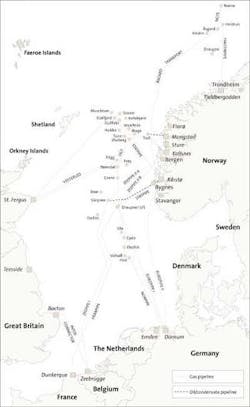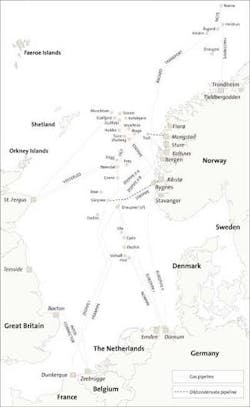Norway entrusts gas pipeline network to single state-owned body
Tariffs, sales contracts also revised
Nick Terdre
Contributing Editor
Following the European Union's gas liberalization directive, Norway, an associate member of the EU and one of its leading gas suppliers, has completely reorganized its gas marketing and transport arrangements. Gassco will play a key role in the new arrangements, which came into force at the beginning of this year.
Gassco, which Storting created in April 2001, operates most of Norway's extensive system of gas pipelines and terminals. It is a strange animal, as CEO Brian Bjordal readily admits: 100% state-owned but owning nothing itself, and working on a no profit/no loss basis. Answerable to the Ministry of Petroleum and Energy, its job is to keep the system running smoothly so commitments to customers are fulfilled.
That job has become easier now that the lengthy transition period during which the new arrangements were planned and negotiated is over. A unified ownership known as Gassled has been introduced for the gas export trunklines and their reception terminals on the continent, and for some internal transport systems – Oseberg, Åsgard, and Statpipe, and the Kårstø terminal to which Statpipe is linked. A neutral access regime and set of tariffs also have been introduced. As well as these reforms, last October gas producers converted sales made under the previous collective marketing system to individual sales contracts, bringing them into line with EU requirements.
In addition to its duties to the government, Gassco's responsibility extends to the owners of the various pipelines and plants that it operates. These are:
- 10 gas pipeline systems – Franpipe, Zeepipe, Europipe I, Europipe II, Haltenpipe, Statpipe, Åsgard Transport System, Norne Gas Transport System, Vesterled, and Oseberg Gas Transport
- One gas processing plant, Kårstø in Norway, and five reception terminals: Zeebrugge in Belgium, Emden and Dornum in Germany, Dunkirk in France, and St. Fergus in Scotland
- Four riser platforms: Draupner South and East, Sleipner Riser, and Heimdal Riser.
It also oversees the operation of several oil and condensate systems: Troll Oil I and II, Sleipner East Condensate, and Vestprocess.
null
The government's intention is that Gassco will eventually take over three more gas pipeline systems – Heidrun Gas Export, Draugen Gas Transport, and Norsea Gas/Norpipe (which includes the Norpipe terminal in Emden) – as well as the Kollsnes gas processing plant. As a general rule, the company will operate pipelines or other facilities that serve more than one set of users, while pipelines serving only one field or set of owners will continue to be operated by those owners.
Gassco therefore plays a crucial role in moving Norway's gas to the producer. Every day it is responsible for the transport of 190 MMcm valued at around NKr200 million. It also transports a large volume of liquids – 380,000 b/d of oil worth NKr70 million and 25,000 metric tons/d of NGLs worth NKr50 million.
null
Running the system – 20 integrated pipelines with 60 installations connected to them and four plants at which gas is blended to export specification – is a highly complex operation. Gassco has a staff of 110, all based at the command center in Bygnes, in southwest Norway. It also has access to a further 900 technical service providers employed by other companies. Not surprisingly, given that Statoil previously operated much of the system, most of Gassco's staff comes from Statoil, as does Bjordal, and, indirectly, Gassco Chairman Brit Rugland. So do many of the service providers.
Day-to-day operations are technically challenging, Bjordal says. Gas produced from each field varies in volume and quality, and the processing plants play an important role in ensuring that deliveries to customers constitute the correct volumes at the correct specifications. There are constant housekeeping demands, for example, when production from one field is interrupted and has to be replaced from another. Even the seasons affect operations – pipeline capacity can vary by plus or minus 5% at different times of year, depending on the temperature of the water.
Keeping all sides happy
The overriding priority is to ensure that the system runs smoothly.
"Our main objectives are to keep the gas flowing, achieve 100% regularity, avoid quality problems, and ensure that buyers don't feel any impact on their deliveries from all the changes," Bjordal says. And all this has to be done within the bounds of the government philosophy that the value of the gas belongs essentially to the producers, and that the transport system, though it must be run very efficiently, should make only a low rate of return.
Gassco needs to cultivate a positive relationship with the owners. To this end, it must be seen to be discharging its responsibilities in an even-handed and neutral manner. At the same time Bjordal is encouraged by the positive opportunities that will come from working with 13 of the world's leading gas producers.
"How well we use their competence could be one of our success criteria," Bjordal says.
The company will have an important input into decision-making and an active role to play as the transport system continues to develop.
There is no lack of future projects and proposals. Work is required at both the major terminals – major debottlenecking is needed at Kårstø while at Kollsnes an NGL plant is to be built. Compression capacity on the Troll gas platform is being increased. New pipelines will be required, for example, to bring Ormen Lange gas down from the Norwegian Sea to the North Sea. Statoil has proposed mid-line compression on Franpipe. If Norway is to take advantage of the UK's growing import demand, new pipeline links will be required to the UK.
With its strong personnel links with Statoil, there are fears that Statoil will enjoy more influence with Gassco than other companies, but Bjordal is not overly concerned.
"It's impressive to see how our employees understand that this is a different world. Given the clarity of a new setting, humans have a great capacity for adapting to a new situation. We have to make sure that this will not be an issue with Statoil, and I have a firm belief that both Statoil and Gassco will succeed in finding their new roles," he says.


